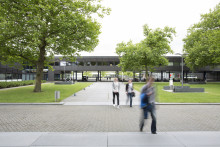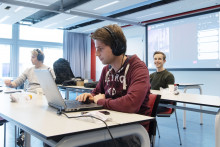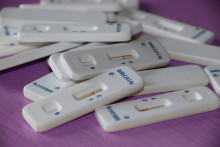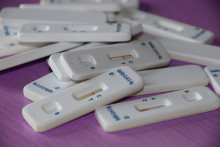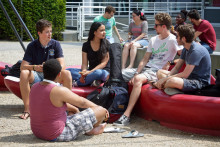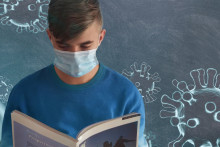At the UT, 219 students and 128 employees completed the survey. The results show that students in particular suffer from the situation. Almost half of them 'suffer a lot' from the corona crisis. Less energy and a sombre or depressed feeling are common complaints. Also more than sixty percent of the students feel more lonely than normal and are worried about their own freedom of movement. 'I want to go out with friends, visit bars, do activities with my study association. In short, I miss my social life', a student says.
A quarter of the employees 'suffer a lot' from the corona crisis. Employees also suffer from sombre or depressed feelings and have less energy. The majority of this group, almost sixty percent, are mainly concerned about the loneliness of people around them. The social consequences are also feared. For example, one scientific employee says: 'In addition to the health risks, I am particularly concerned about the uncertain near future and developments in the world.’
Survey
Newcom's survey was conducted at nine higher education institutions: the University of Twente, Delft University of Technology, Eindhoven University of Technology, Groningen University, Utrecht University, VU University Amsterdam, Avans University of Applied Sciences, Groningen University of Applied Sciences and Utrecht University of Applied Sciences. A total of 1202 students and 871 staff members completed the survey. The independent news media of the nine institutions shared the survey with students and staff through their own channels.
The total response rate is sufficiently high to be able to make reliable statements on a total level across the institutions, according to research agency Newcom. Given the number of participants from the UT, the results for the UT should be regarded as indicative. ‘But the results do paint a certain picture and a direction.’
Working from home
Over the past period, almost all of the employees have worked from home. Remarkably, almost three quarters of them want to continue to work partly from home after the crisis. ‘I can concentrate better because my colleagues can't distract me,' says one employee. ‘I can also organise my working hours more flexibly.’ However, working from home also leads to problems: half of the UT employees experience both physical and mental complaints as a result of working from home. This percentage is higher than the average across all participating institutions, where approximately 40 percent of this group experience such complaints. What employees miss the most because of working from home? Three quarters of the employees who responded mention their colleagues.
Students too miss their fellow students. Also, most students find it difficult to concentrate at home and do not study as much as they did before the crisis. ‘At home I'm always in the same room. I get easily distracted and find it difficult to relax at the end of the day', a student says. They grade studying at home with a 4.9 out of 10. According to the students, this has more to do with the situation than with the UT: two thirds of the students think that the university adapts quite well to the corona crisis.
Easing
Now that the first peak is behind us, less than half of the employees say they still adhere to all the rules. The other half follow the rules to a lesser extent, but still see the benefit of it. One employee does wonder, however, why the rules of the UT are 'stricter than those of the RIVM'. Students are a little less law-abiding. A third of them still abide by all the rules. However, the vast majority of students still see the usefulness of the COVID measures. One of the students does have an advice for the Executive Board: 'Give more trust and responsibility to employees and students, so that they can come to an effective solution themselves.’
'further deepening is needed'
'The results of the survey show that it is not an easy period for staff and students', says UT spokesman Laurens van der Velde. 'That is in line with the signals we are getting from the organisation itself. A lot of staff and students are asked to adapt to the changing situation and we are proud of the way they deal with it. The image of the UT is largely in line with that of other universities, although it should be noted that the size of the survey is somewhat too small to demonstrate significant differences.'
'We recognise the impression that staff and students mainly miss contact with other staff and students. The activities that we have on campus again are specifically aimed at the need to meet each other. A further deepening is needed to translate this into how we can best support the UT community. That is why various evaluations and studies have been and are being carried out, within courses, by study associations and at UT level. This further research is necessary to gain insight into additional measures that need to be taken in the coming period and to give everyone the opportunity to provide input for this.'


